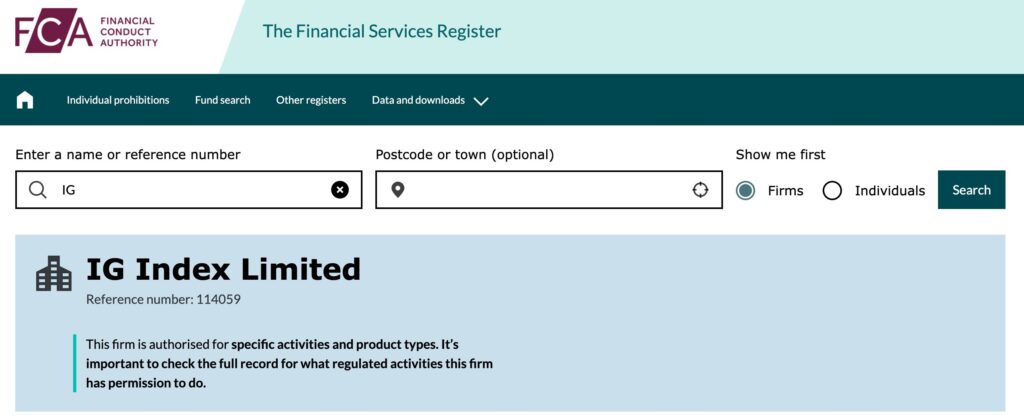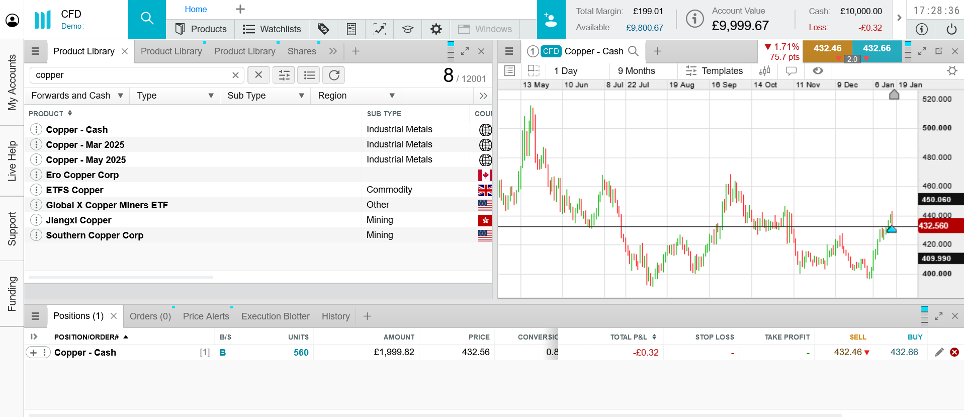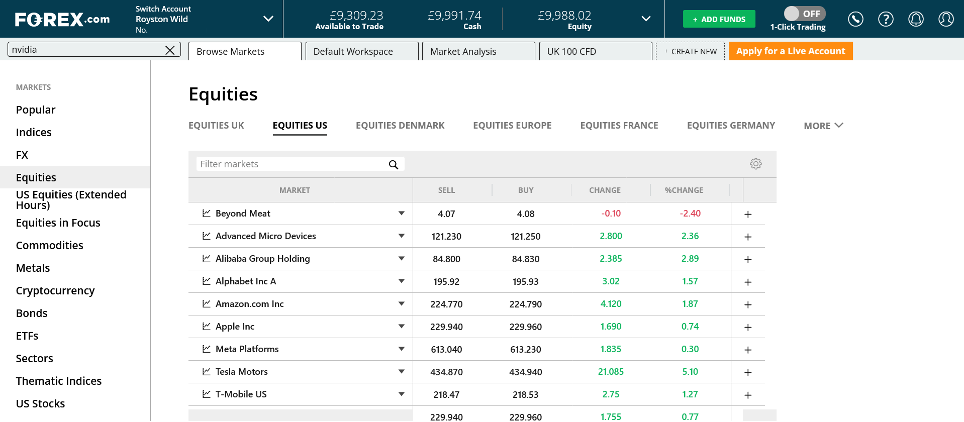Best CFD Brokers 2026
We’ve thoroughly assessed the top CFD brokers to identify the absolute best, considering platform quality, market access, fees, leverage options, and trust.
-
1
Over 8,000 CFDs on various stocks, indices, forex, and commodities are offered. The TWS platform is ideal for experienced traders, providing a wide range of over 100 order types and algorithms, as well as premier market data from top sources like Reuters and Dow Jones.
-
2
Trust Platform Assets Fees Accounts Research Education Mobile Support 3.0 InstaTrade provides the option to trade CFDs in a variety of markets, including stocks, indices, forex, and commodities. Its unique feature is the dynamic leverage that goes up to 1:1000, which can increase potential returns and losses. It also offers negative balance protection, which prevents accounts from dropping below zero.
-
3
Trust Platform Assets Fees Accounts Research Education Mobile Support 4.6 Exness offers CFDs on forex, stocks, indices, commodities, and cryptos with up to 1:2000 leverage for advanced traders, featuring over 100 technical indicators in its own platform.
-
4
Trust Platform Assets Fees Accounts Research Education Mobile Support 4.8 You can trade over 2,250 CFDs 24/5 in various markets like forex, commodities, indices, stocks, and bonds. IC Markets uses high-level technology and liquidity to provide the best conditions for scalpers, hedgers, and algorithmic traders.
-
5
Trust Platform Assets Fees Accounts Research Education Mobile Support 4.5 RoboForex provides over 12,000 CFDs, which include forex, stocks, indices, commodities, futures and ETFs. Traders can start with a $10 deposit and enjoy high leverage of up to 1:2000. Despite its offerings, RoboForex has slower execution speeds of 1-3 seconds, compared to IC Market's 0.35 seconds. This could affect traders who employ quick strategies.
Top CFD Brokers Comparison
Safety Comparison
Compare how safe the Best CFD Brokers 2026 are.
Mobile Trading Comparison
Compare the mobile trading features of the Best CFD Brokers 2026.
Comparison for Beginners
Compare how suitable the Best CFD Brokers 2026 are for beginners.
Comparison for Advanced Traders
Compare how suitable the Best CFD Brokers 2026 are for advanced or professional traders.
Accounts Comparison
Compare the trading accounts offered by Best CFD Brokers 2026.
Detailed Rating Comparison
Compare how we rated the Best CFD Brokers 2026 in key areas.
Fee and Cost Comparison
Compare the cost of trading with the Best CFD Brokers 2026.
How Popular Are These CFD Brokers?
Many traders prefer the most popular CFD trading platforms, as a large customer base ensures that the broker is tried and tested. Below is the popularity of each CFD broker in terms of the approximate number of clients.
| Broker | Popularity |
|---|---|
| InstaTrade |
|
| Interactive Brokers |
|
| Exness |
|
| RoboForex |
|
| IC Markets |
|
Why Trade With Interactive Brokers?
Interactive Brokers is ideal for seasoned traders due to its robust charting platforms, updated data, and adaptability, especially with the IBKR Desktop application. Its exceptional pricing and advanced order features appeal to traders, and its variety of stocks remains unmatched in the market.
Pros
- IBKR, primarily designed for skilled traders, has expanded its appeal recently by eliminating its initial $10,000 deposit requirement.
- The TWS platform is designed for intermediate to advanced traders. It includes over 100 order types and a dependable real-time market data feed that rarely experiences downtime.
- Interactive Brokers has introduced ForecastTrader, a zero-commission service allowing users to trade yes/no Forecast Contracts on political, economic, and climate events. Contracts offer fixed $1 payouts, 24/6 market access, and a 3.83% APY on held positions.
Cons
- IBKR offers many research tools. However, the tools are not uniformly distributed across trading platforms and the web-based 'Account Management' page, causing confusion for the users.
- Customer service may take time to respond, and there may be delays in fixing problems based on tests. It could be difficult to reach the customer service promptly.
- Only one active session per account is allowed, which means you can't run the desktop version and mobile app at the same time. This can sometimes lead to a frustrating trading experience.
Why Trade With InstaTrade?
InstaTrade provides active trading on an extensive platform. It has a unique offering known as Fixed Income Structured Product (FISP), which allows for passive investment. Investors can potentially earn up to a 50% return within 6 months, provided certain conditions are fulfilled.
Pros
- InstaTrade promises returns using its structured passive trading solution (FISP), with applications processed within 24 hours.
- InstaTrade provides a high-quality range of charting tools for traders. Its web trader includes over 250 indicators, 11 types of charts and a design that's easy to use.
- InstaTrade TV provides video interviews and insightful market information about stocks, cryptocurrencies, and more. It assists in identifying opportunities for quick trading.
Cons
- The advertising of FISP, specifically about its "profit guarantee" and "risk-free trading," creates unease.
- InstaTrade is registered in the British Virgin Islands, providing minimal regulatory protections for retail traders.
- InstaTrade's learning resources are helpful for new traders but are not as organized or comprehensive as those provided by top companies such as eToro.
Why Trade With Exness?
Exness is an excellent choice for active forex traders aiming to reduce costs after lowering spreads, enhancing execution speeds, and offering trading on over 100 currency pairs with more than 40 account currencies.
Pros
- Wide variety of account types for all experience levels, including Cent, Pro, and the new Raw Spread, ideal for traders.
- Exness Terminal provides an easy experience for beginners with interactive charts, and creating watchlists is simple.
- Competitive spreads for USOIL and BTCUSD in 2024 start from 0 pips, with low commissions from $2 per side.
Cons
- MetaTrader 4 and 5 are supported, but TradingView and cTrader are not available yet, despite increasing demand from traders and their integration with other platforms like Pepperstone.
- Retail trading services are not available in some areas, including the US, UK, and EU, making them less accessible compared to leading brokers like Interactive Brokers.
- Besides a mediocre blog, educational resources are lacking, especially compared to category leaders like IG, which offer a more comprehensive trading journey for new traders.
Why Trade With IC Markets?
IC Markets provides excellent prices, quick execution, and smooth deposits. The utilization of sophisticated charting platforms such as TradingView and the Raw Trader Plus account makes it a preferred choice for intermediate to advanced traders.
Pros
- IC Markets, a well-regulated and respected broker, emphasizes client security and transparency for a trustworthy global trading experience.
- IC Markets provides some of the smallest spreads in the industry, offering 0.0-pip spreads on major currency pairs. This makes trading particularly cost-efficient for traders.
- IC Markets won DayTrading.com's 'Best MT4/MT5 Broker' in 2025 for its top-notch MetaTrader integration, perfected over years to enhance the platform experience.
Cons
- IC Markets have a selection of metals and cryptos for trading through CFDs, but their range is not as wide as brokers such as eToro. This may limit options for traders who are interested in these asset types.
- The range and quality of educational materials, such as tutorials and webinars, require improvement. This lag falls behind competitors like CMC Markets and reduces its suitability for novice traders.
- Some withdrawal methods require fees such as a $20 wire charge. This can reduce profits, particularly for traders who withdraw frequently.
Why Trade With RoboForex?
RoboForex offers a broad selection of over 12,000 trading markets along with ECN accounts, impressive charting, and loyalty incentives. It is also advantageous for stock traders due to its intuitive R StocksTrader platform, which provides access to over 3,000 shares, lower fees starting at $0.01, and advanced watchlists.
Pros
- The broker provides up to 1:2000 leverage for some accounts, a peak level in the industry. This high leverage lets traders increase their potential gains, but also increases risk.
- RoboForex offers tight spreads starting at 0 pips and low minimum deposits from $10, making it affordable. Trading with micro lots additionally reduces entry barriers for new traders.
- RoboForex offers more than 12,000 instruments for trading. This includes forex, stocks, indices, ETFs, commodities, and futures. Comparatively, this surpasses the trading opportunities available from most online brokers.
Cons
- RoboForex, despite having many platforms, does not yet support the commonly used cTrader. This can dissuade traders who favor this platform for trading, which is accessible with firms such as Fusion Markets.
- RoboForex offers many account types which, although flexible, can be daunting for new traders to select the most appropriate for their trading preferences. Other platforms like eToro simplify the process with a single retail account option.
- RoboForex provides fair spreads, but some of its account types have high trading commissions up to $20 per lot, which are more expensive compared to more affordable brokers like IC Markets.
Filters
Methodology
We performed a thorough analysis of our evolving database of online brokers that offer CFD trading.
This included recording and assessing 7 CFD-specific data points, along with 200+ other metrics, and incorporating feedback from our hands-on testers to evaluate the overall trading experience.
The CFD brokers listed here are ranked according to the highest overall ratings from our evaluations.
What To Look For in a Broker For CFD Trading
When choosing a broker, there are many factors to consider. However, based on our extensive experience testing CFD providers, we’ve simplified the decision-making process by highlighting the six key factors:
1. Regulations
Given the high-risk nature of CFD trading, the first thing to check is that the brokerage in question is licensed to deal by a respected financial authority, preferably in your home jurisdiction.
Handing over any personal information or cash before confirming this could leave you wide open to fraud.
Not all regulatory authorities provide the same level of protection for investors, however. So it’s important to consult a regulator from a country with well-developed financial markets like Europe, North America or Asia.
Choosing a well-regulated broker is particularly important given that financial bodies have introduced various restrictions on CFD providers over the years, such as:
- European Securities and Markets Authority (ESMA) imposing leverage limits for retail traders in the EU (1:30).
- UK Financial Conduct Authority (FCA) banning the sale of crypto derivatives to retail clients (crypto CFDs).
- Australian Securities and Investments Commission (ASIC) restricting the marketing of high-leverage CFD products (promotions to induce trading).
IG remains our most trusted CFD broker. It’s been providing CFD trading for 25+ years, it’s listed on the London Stock Exchange for financial transparency (IG Group Holdings Plc), it’s authorized by 10+ top-tier regulators (including FCA, ASIC, NFA, CFTC, and DFSA), and some of our team have personally chosen it for real-money trading.

2. Leverage
A core component of CFD trading involves the use of borrowed funds, known as trading with leverage.
If you’re planning to go down this route, consider carefully the amount of leverage on offer and any margin requirements. These can vary greatly according to the broker as well as the type of underlying security speculated upon.
For instance, forex can usually be traded with higher leverage, while volatile instruments like stocks and crypto generally have lower leverage.
Vantage, which offers high leverage of up to 1:500 on certain markets, stands out as an attractive provider for traders wishing to borrow funds. It also offers a trading calculator which I find great for calculating potential returns/losses when trading on margin.
Expert take: While leverage can lead to gigantic returns, remember that borrowing money can also result in large losses if the market moves against you.
3. Assets
Investors can participate in a wide spectrum of financial markets with CFDs, including forex, stocks, crypto and commodities. However, the selection of markets on offer can differ amongst brokerages.
For example, some high-risk assets like crypto CFDs may not be available from any broker, depending on where you happen to be located. This is due to varying regulatory standards across different regions.
Year after year CMC Markets impresses during testing for its vast range of 12,000 CFDs, making it great for clients looking to trade across multiple asset classes, from currencies and equities to bonds, interest rates and ETFs.

4. Fees
Trading costs can vary significantly between CFD brokers. This may come in the form of varying bid and ask spreads, for instance, as well as commissions, deposit/withdrawal fees, and inactivity charges.
Competition is fierce among CFD brokerages, so it pays to shop around to find the best deal for you.
Some companies may charge more than others, but they may also offer a better service (like a more intuitive platform or better execution speeds) which active traders may be happy to pay for.
IC Markets is one of the lowest-cost CFD providers we’ve evaluated, featuring raw spreads from 0.0 pips with a $3.50 commission, zero inactivity fees or deposit charges, alongside excellent execution speeds averaging 35 milliseconds.
5. Platforms
Many brokers offer their own bespoke trading platforms and increasingly apps, while some allow traders to do business using third-party software like MetaTrader 5 (MT5).
Think about things like the tools each platform offers, as well as other factors like ease-of-use and charting features if you’re interested in technical analysis.
FOREX.com is a standout pick if you’re seeking a superior platform for trading CFDs. I love its Web Trader for its comprehensive user experience. You get 10 chart types and 80+ technical indicators, along with an integrated economic calendar and account management tools, streamlining the entire trading process.

Tip: Many brokers offer a demo account that will let you ‘test drive’ their trading platform and their broader service before depositing any money and trading real-world markets.
6. Risk Management
CFD trading is fast-paced and, for those who are also using leverage, also high risk. For this reason, choosing a broker that offers risk management devices can be critical in reducing losses or booking profits.
Most brokerages we’ve evaluated allow you to place ‘stop loss’ or ‘take profit’ orders. These devices automatically close your position when an asset price either falls or rises to a pre-selected level, whichever happens first.
Many brokers also offer negative balance protection as a standard feature. This ensures that you can’t lose more money than you’ve deposited in your trading account.
XTB goes one step further, also providing a guaranteed stop loss order (GSLO), which means your position is closed at a specified price, even during market volatility, eliminating the risk of slippage, unlike a standard stop loss.
FAQ
What Is a CFD?
Contracts for Difference (CFDs) enable traders to speculate on the price movements of financial markets without actually owning the underlying asset.
Instead, a CFD is an agreement between a trader and a broker to exchange the difference in the value of an asset from when the trade is opened to when it is closed.
CFDs are versatile and allow for both long positions (profiting if the market rises) and short positions (profiting if the market falls).
They are highly popular due to their leverage feature, which allows traders to control a larger position with a smaller amount of capital, though this also increases risk.
Example Trade:
Let’s say I believe the price of gold will rise and decide to open a long CFD position when gold is priced at $1,950 per ounce. I invest $1,000 with a broker offering 1:10 leverage, giving me exposure to $10,000 worth of gold.
If the price of gold increases to $1,970, I make a profit of $200 (20 x $10). However, if gold falls to $1,930, I incur a $200 loss, showing the potential risk of leveraged trading.
What Is a CFD Broker?
A CFD broker is a financial intermediary that allows traders to bet on price movements across multiple markets.
A CFD broker doesn’t just facilitate the trade itself. Their other functions usually include:
- Supplying trading tools like charting software and educational resources to help inform investors’ decisions.
- Providing leverage (or borrowed funds) that allows traders to control larger positions.
- Offering a user-friendly trading platform through which business is transacted.




